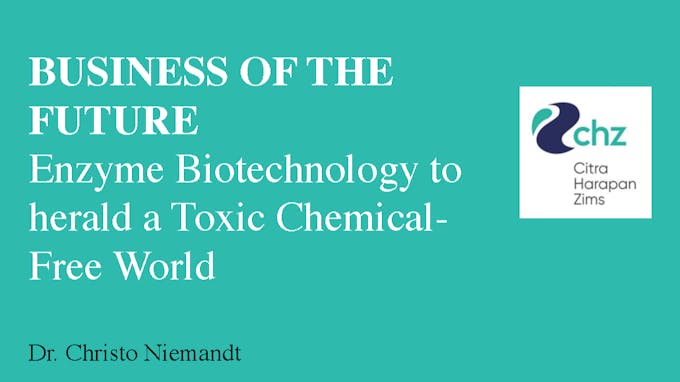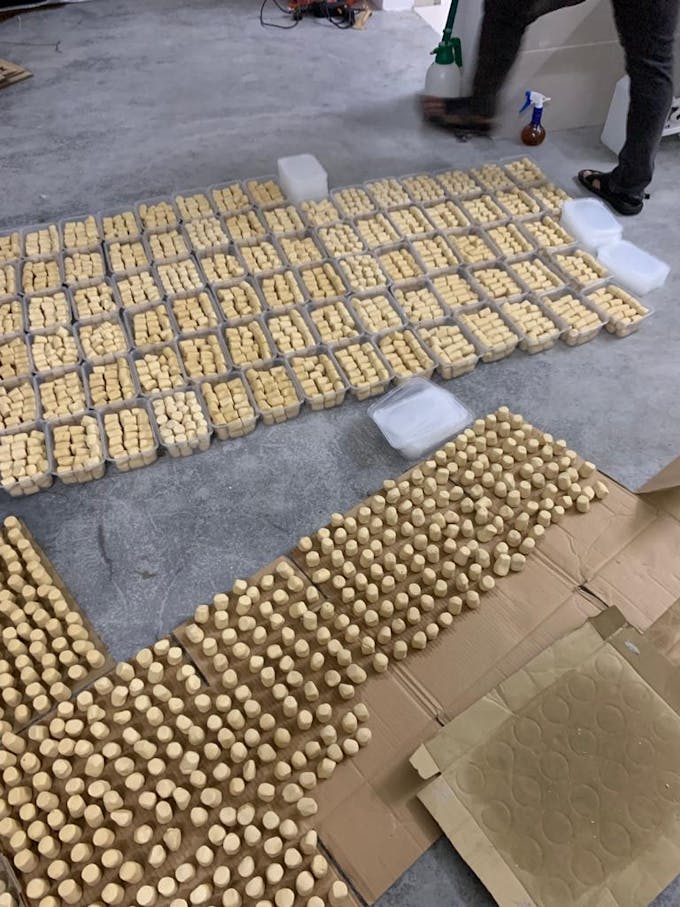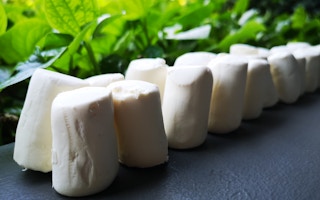A solution marketed in Southeast Asia as an environmentally-safe way to degrade plastic waste, kill pests, and fatten livestock, among other uses, has been called out as green tech fraud.
The chemical formula, developed by South African scientist Christo Niemandt, made headlines in Singapore three years ago as a more eco alternative to insecticidal fogging to kill cockroaches and mosquitoes deployed by a town council. It was also fed to livestock in a trial by one of Singapore’s largest meat suppliers.
The compound, which can be stored as a paste or cake-like pellets, has since been used by six different companies in three countries in the region, leaving a trail of legal disputes, police investigations, failed ventures, and millions in business losses.
Known in various forms as Glutezyme, CMO, and Biofilm, among other brand names, it was promoted in Singapore as a special enzyme derived from edible plants that can kill cockroaches in a video report by regional broadcaster Channel NewsAsia and national newspaper TODAY in May 2017.
Its inventor claimed that his formula attacks pathogens in the metabolic systems of insects, causing them to “explode” after carbon dioxide is released in their bodies.
However, forensic tests conducted by professors from National University of Singapore and Nanyang Technological University (NTU) have found that the concoction does not contain any enzymes. It is mainly crude glycerine—the by-product of biodiesel production—with some chemicals, methanol and potassium hydroxide, added to the mixture.
Due diligence in green tech
NTU professor Tan Choon Hong, who is president of the Singapore National Institute of Chemistry, said that as interest grows in green technology to solve sustainability challenges, investors are exposing themselves to risk if they do not place more emphasis on verifying the science behind new innovations.
“Due diligence in science takes time and money, but many business people do not understand this,” Professor Tan told Eco-Business.
“If new investors [in green tech] have support from science experts in their companies, they shouldn’t have any issues. But if they don’t invest in science expertise, they put themselves at huge risk.”
Is the formula toxic?
Crude glycerine can be used as an animal feed, but with the methanol removed—as the alcohol can be toxic, a study by researchers at Ohio State University (OSU) has found.
The study’s author, Dr Maurice Eastridge, professor and associate chair of the department of animal sciences at OSU, told Eco-Business that crude glycerine from biodiesel production is very variable in composition, and contains some chemicals—including potassium hydroxide, methanol and salts—that can be harmful to the animals fed it. But these chemicals are unlikely to build up in animal tissues or milk and harm human health, he said.
However, the United States Food and Drug Administration has warned against using crude glycerine with high concentrations of methanol in animal feed.
Niemandt’s formula passed an LD50 food grade test—which tests for a chemical compound’s toxicity—in Singapore by German testing firm TÜV SÜD in 2016.
How the ‘revolutionary’ formula is made
The raw ingredient is used cooking oil. Microbes were supposedly added to large reactors containing the cooking oil to produce the enzymes. But forensic tests revealed that methanol and potassium hydroxide were added to the solution instead.
Pumped into storage tanks, the resulting liquid was left to separate; biodiesel rose to the surface, leaving the ‘enzyme’ formula at the bottom—this was actually crude glycerin, with some chemical waste, Niemandt’s detractors claim.
A promotional video was made to explain the process of making the formula.
Use of his formula, which was developed with biotech firm E-Organic Solutions Pte Ltd, initially ended in Singapore in June 2017 after Tampines Town Council’s month-long trial, and was later used in a trial to boost the growth rate of livestock for one of Singapore’s biggest meat suppliers.
Frank Ngoh, the town council’s general manager, told Eco-Business that there was no follow-up of the trial by the supplier, E-Organic Solutions, despite several reminders. “As a result, the product was not rolled out in Tampines Town,” he said.
Singapore’s National Environment Agency (NEA) told Eco-Business that the formula’s application for approval for use in the city-state is “still pending as NEA has not received the necessary clarifications from the registrant in order to verify the product composition and safety.”
According to a document seen by Eco-Business, the NEA required further studies to substantiate the product’s claims, including more rigorous toxicity tests and proof that it was not harzardous to the environment.
Use of an unregistered pest control solution in Singapore will result in a S$20,000 fine and/or up to three months in prison.
An E-Organics spokesperson told Eco-Business that the company had been led to believe by Niemandt that the formula’s active ingredient was an enzyme, and have not since marketed or sold the solution in Singapore.
Niemandt has not responded to Eco-Business questions, saying that he cannot comment until an investigation by Singaporean, Malaysian and Russian authorities has been completed.
Sounding the alarm
Singaporean Harry Huo, director of green-tech venture capital firm Global919 and a former business partner of Niemandt’s, filed police reports against the South African in May 2019. He claimed in the police report that Niemandt “wilfully misled” the Singapore government with a “fraudulent” pest control solution, and has used the coverage by Channel NewsAsia to promote his solution and mislead other investors.
In the police report, Huo alleged that Niemandt claimed his formula, by virtue of a proprietary enzyme he invented, could kill pathogenic insects with 100 per cent effectiveness, kill Escherichia coli (E. coli) and Salmonella bacteria with 100 per cent effectiveness, degrade styrofoam, boost livestock, fish and plant growth, remove rancid odours, accelerate coral growth, convert manure to fertliser, degrease food traps, and work as a human detox supplement.

A presentation by Christo Niemandt while working for CHZ. Image: CHZ
Huo, who previously worked in corporate finance for the Monetary Authority of Singapore, and launched Global919 in 2016, also alleged in the police report that Niemandt does not hold a doctorate in biochemistry from the University of South Africa (Unisa), which he claimed the scientist had apparently been using to “promote his fraudulent claims and mislead investors”.
In a signed statement from May 2019, witnessed by the directors of Global919-owned Indonesian venture Citra Harapan Zims (CHZ), a company that marketed Neimandt’s formula, the South African admitted that he has not completed his PhD.
Unisa had not confirmed that Niemandt holds no such qualification from the university at the time of publishing.
In December 2019, Niemandt filed police reports of his own against the directors of CHZ.
Singapore Police told Eco-Business these cases are under investigation.
“
Due diligence in science takes time and money, but many business people do not understand this.
Professor Tan Choon Hong, Nanyang Technological University, Singapore
Retracing his steps
Niemandt teamed up with E-Organic Solutions to promote his formula as a biopesticide in 2016.
After that venture ended following requests from the NEA for further tests on the compound, Niemandt joined one of Indonesia’s largest conglomerates to supply his solution to a vendor in Singapore. He was given a laboratory to test how his formula could shorten the rearing time of livestock.

The prepared formula in pellet form at a plant in Malaysia. Image: Harry Huo
The trial was deemed to be a success, and according to emails seen by Eco-Business, the tested livestock was shipped to Singapore—although it is unclear whether the meat actually went on sale in the city-state.
While working with the Indonesian firm as a consultant, Niemandt co-founded Singapore venture Tesla Green in March 2018 with Huo and fellow Singaporean Chia Boon Liong, an environmental engineer with experience in corporate finance, to sell his formula as a biopesticide.
After joining Tesla Green, Niemandt allegedly told Huo that his previous employer had threatened him with his life after his laboratory in Indonesia was broken into, and some of the formula allegedly stolen, according to emails seen by Eco-Business.
Huo said that he, and his business partners, later co-founded CHZ for Niemandt to produce his formula, paid him a salary, and hired a bodyguard to protect him and his son.
Huo and his business partners became suspicious when Huo’s business partner contacted Niemandt’s former employer in Indonesia, and asked them about the circumstances of his departure.
In May 2019, CHZ fired Niemandt from his role of chief scientist after tests revealed the formula to be mainly crude glycerine, and his claims to hold a doctorate were found to be baseless.
CHZ sent a legal notice to Niemandt on 10 January 2020 for financial and reputational loss.
Niemandt is believed to be currently working with another Singaporean-owned business, Hock Wee Nurseries, an orchid farm in Malaysia. Hock Wee Nurseries has not responded to Eco-Business’ requests for comment.








